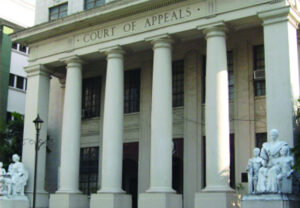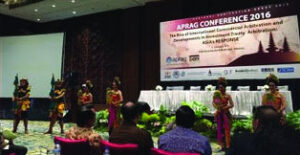 In a recent ruling in CA-G.R. SP No. 144125, Wing-An Construction & Development Corporation v. Construction Industry Arbitration Commission and Landco Pacific Corporation, the 16th Division of the Court of Appeals, through Associate Justice Ricardo R. Rosario, ruled that a former associate of a party’s counsel may be disqualified from sitting as an arbitrator— 35 years af ter his resignation from the firm.
In a recent ruling in CA-G.R. SP No. 144125, Wing-An Construction & Development Corporation v. Construction Industry Arbitration Commission and Landco Pacific Corporation, the 16th Division of the Court of Appeals, through Associate Justice Ricardo R. Rosario, ruled that a former associate of a party’s counsel may be disqualified from sitting as an arbitrator— 35 years af ter his resignation from the firm.
In its Decision dated December 5, 2016, the Court of Appeals cited General Standard (2) of the 2014 International Bar Association (IBA) Guidelines on Conflicts of Interest in International Arbitration, which provides that:
(a) An arbitrator shall decline to accept an appointment or, if the arbitration has already commenced, refuse to continue to act as an arbitrator, if he or she has any doubt as to his or her ability to be impartial or independent. … The PhiliPPine ADR Review Broadening its scope of arbitration advocacy www.PDRCi.ORG feBruarY 2017 Court of Appeals disqualifies arbitrator 35 years after leaving law firm of party’s counsel
(c) Doubts are justifiable if a reasonable third party, having knowledge of the relevant facts and circumstances, would reach the conclusion that there is a likelihood that the arbitrator may be influenced by factors other than the merits of the case as presented by the parties in reaching his or her decision.
Assuming that the Guidelines applies to proceedings before the Construction Industry Arbitration Commission (CIAC), the Court of Appeals held that it does not mandatorily require that an arbitrator disclose his past association with a law firm that happened decades ago. It pointed out that the relationship restrictions “refer only to present and current relationships or past relationships not exceeding three years prior to a nomination as an arbitrator.”
In the case of an arbitrator who was appointed as Chairman of the Tribunal for the CIAC arbitration between Wing-An Construction & Development Corporation (“Wing-An”) and Landco Pacific Corporation (“Landco”), who disclosed his past employment with Landco’s counsel 35 years ago, the appellate court ruled that this disclosure was prompted not by any compulsory requirement under the Guidelines or CIAC’s rules of procedure but rather “by his very own assessment that such past association was a questionable circumstance.”
The Court of Appeals reasoned that “[i]n the end, whether or not a circumstance is such that might affect his credibility, impartiality and probity, so much so that he is compelled to disclose it to the parties, is a matter left entirely to the good discretion of [the arbitrator] … When he made the disclosure, he personally determined that the circumstance in question was ‘likely to give rise to justifiable doubts as to (his) impartiality or independence.’” Thus, when Wing-An moved for the arbitrator’s voluntary inhibition after his disclosure of his past employment with Landco’s counsel, the appellate court held that the arbitrator should have accepted the challenge.
The Court of Appeals granted Wing-An’s petition for certiorari and ordered the arbitrator to desist from participating in the CIAC arbitration.
The ruling drew adverse comments from arbitrators, who questioned the court’s ruling. Former PDRC President Eduardo Ceniza, for one, cited the IBA Explanation to General Standard (3) that “A disclosure does not imply the existence of a conflict of interest. An arbitrator who has made a disclosure to the parties considers himself or herself to be impartial and independent of the parties, despite the disclosed facts, or else he or she would have declined the nomination or resigned. An arbitrator making a disclosure thus feels capable of performing his or her duties.”
It is surprising that the Court of Appeals even acted on the petition, since it had no jurisdiction under Section 33 of the ADR Act of 2004, Article 11 (5) of the 1985 Model Law, and Rule 9.6.5 of the CIAC Arbitration Rules to review the appointing authority’s ruling on the challenge to the arbitrator.
A Report on APRAG Conference 2016
PART ONE
The Asia Pacific Regional Arbitration Group (APRAG), a 42-member organization of arbitration and mediation institutions in the Asian region, recently held its biennial conference on October 6 to 8, 2016 in Bali, Indonesia. The theme of the conference was “The Rise of International Commercial Arbitration and Developments in Investment Treaty Arbitration: Asia’s Response.”
Held at the beautiful Sofitel Nusa Dua Beach Resort, the conference sought to provide a forum for arbitration experts to discuss and seek solutions to recent challenges to international commercial arbitration as a result of the rapid economic growth in Asia.
Recently, Asia has witnessed a surge in international commercial arbitration as a preferred mode of dispute resolution, even in investor-state dispute settlement. While the growth of international commercial arbitration has been appealing, it has posed challenges especially for arbitration institutions in the Asian region.
The author attended as the sole representative of the Philippine Dispute Resolution Center (PDRC), one of the founding members of APRAG, which was established in 2004. The event was hosted by the BANI Arbitration Center (BANI) headed by Chairman M. Husseyn Umar.
Pre-conference dinner meeting, Oct. 6
The conference started with a Pre-Conference Day Dinner Meeting of APRAG representatives on Thursday, October 6. APRAG President Yu Jianglong, also the Secretary General of the China Chamber of International Commerce (CCOIC) and the China International Economic and Trade Arbitration Commission (CIETAC), welcomed the conference delegates.
Mr. Yu reported that from 2013 to 2016, APRAG accepted two more membership applications from the Hong Kong Mediation and Arbitration Centre and the Qingdao Arbitration Commission (QDAC), bringing the total APRAG membership from 40 to 42. Mr. Yu noted the participation of APRAG in a growing number of international conferences during this period, including others the Hong Kong International Arbitration Summit, the Kuala Lumpur Arbitration Week, the Sydney Arbitration Week and the China Arbitration Week.

Mr. Yu also noted APRAG’s participation in the various UNCITRAL meetings for the past three years, providing opinions on the proposed revisions on the UNCITRAL Notes on Organizing Arbitration and the UNCITRAL Model Law. The APRAG membership then discussed the establishment of a permanent office for the APRAG Secretariat and agreed that this would be further studied by a special committee under the incoming APRAG President, with Dr. Michael Pryles [former President of APRAG and the Australian Centre for International Commercial Arbitration and former chair of the Singapore International Arbitration Centre (SIAC)] and Mr. Philip Yang [former APRAG President, past Hong Kong representative to the ICC International Court of Arbitration, and Honorary Chairman of the Hong Kong International Arbitration Centre (HKIAC)] as committee members.
The APRAG membership then proceeded to elect the new officers for the incoming term. BANI’s Mr. Umar was elected as President and eleven heads of APRAG member institutions were elected as Vice-Presidents, including Prof. Dr. Colin Ong (President of the Arbitration Association of Brunei Darusaalam), Dr. Fuyong Chen [Secretary General of the Beijing Arbitration Commission (BAC) and Beijing International Arbitration Center (BIAC)], Ms. Teresa Cheng (Chairperson of the HKIAC), Dr. Michael Hwang (Chief Justice of the Dubai International Financial Centre Courts), and Prof. Hi-Taek Shin (Chairman of the Seoul International Dispute Resolution Center), and PDRC’s President Greg Navarro.
The new set of APRAG officers will be assisted by an advisory committee composed of APRAG’s past presidents, Dr. Pryles, Mr. Yang, and Datuk Prof. Sundra Rajoo [Director of the Kuala Lumpur Regional Centre for Arbitration (KLRCA) and current President of the Chartered Institute of Arbitrators (CIArb)]. The APRAG membership meeting ended with congratulatory greetings for
incoming President Mr. Umar and a note of thanks to outgoing President Mr. Yu.
Day One of Conference, Oct. 7
On Friday, October 7, the APRAG Conference began with a Balinese traditional procession.
After the welcome address of BANI’s Chairman and incoming APRAG President Mr. Umar, outgoing APRAG President Mr. Yu delivered his opening address where, among others, he stressed that arbitration is a brother/sister of court litigation, not its rival.
H.E. Dr. Akp Mochtan, ASEAN Deputy Secretary General for Community and Corporate Affairs, then delivered the keynote address of the ASEAN Secretary General, H.E. Le Luong Minh. He was followed by Prof. Dr. H.M. Hatta Ali, Chief Justice of Indonesia’s Supreme Court, who delivered the second keynote address, stressing that with the rise in the quantum of trade and investment in the ASEAN Economic Community, arbitration looked set to be the dispute resolution mechanism of choice going forward.
The APRAG Conference opened with the striking of the Balinese cultural gong to give symbolic blessing to the event. Session 1 of Day 1 was on Diversity and Unification of Arbitration Practices in Asia, which was chaired by Dr. Pryles. Among the issues discussed and their discussants were: (a) is there a common international arbitration culture in the Asia Pacific Region?
(Denton Rodyk’s Lawrence Teh), (b) is the march of common law procedure too pervasive? (Nagashima & Ohno’s Yoshimi Ohara), (c) who should control the length of a hearing? (Dr. Hwang), (d) is the role of arbitrators different? (International Centre for Dispute Resolution’s Michael Lee), (e) is there a fundamental difference in the approach to commercial transactions? (Gilt Chamber’s Kim Rooney), (f) is the approach to dispute resolution in general different? (Mr. Yang), and (g) is it possible to ensure international uniformity in arbitration procedures and culture? (Singapore International Commercial Court’s Judge Prof. Anselmo Reyes).
Session 2 was on Third Party Funding and Costs in Investment and Commercial Arbitration, which was chaired by Arbitration Association Brunei Darussalam’s Prof. Dr. Colin Ong. Among the issues discussed and their discussants were (h) should third-party funding in investment and commercial arbitration be allowed? (Hogan Lovells Hong Kong’s James Kwan), (i) issues of confidentiality and privilege: can third-party funding be regulated? (Graf & Pitkowitz’s Dr. Nikolaus Pitkowitz), ( j) should there be a harmonized system of costs in international arbitration? (Seoul National University Law School’s Prof. Ben Hughes), (k) are there any best practices for reducing time and costs in investment treaty arbitration and commercial arbitration that can be adopted throughout the region? (Prof. Michael O’Reilly), (l) can an egregious error on the award of costs by an arbitral tribunal be challenged in the seat and at the courts of enforcement? (Stephen Nathan), and (m) should there be harmonization of practices on dealing with security for costs in the Asia-Pacific region? (Andrew G. Moran).
Next issue: Day One, Sessions 3 and 4 and Day Two of APRAG Conference.
